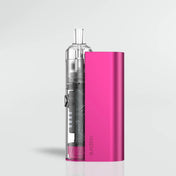Whether you are a vaper or a smoker, you are consuming nicotine. It is the addictive substance that keeps us coming back for more, and also the reason many people switch to vaping; unlike cigarettes e-liquids give you the ability to wean yourself off nicotine by working your way down to 0mg products.
While the above may be true, the methods may be different, but the affect nicotine has on our bodies is the same whether you inhaled it from a vaping device, or a cigarette.
Nicotine has a number of effects on the body, but it is worth noting that many of the worst side-effects of smoking, from cancer to skin sagging, are largely attributed to the many additional harmful substances found in tobacco smoke, not the nicotine itself. However, the nicotine’s addictive nature means as smokers we become hooked on inhaling all those nasties just to satisfy a nicotine craving.
As found by Public Health England, vaping contains 95% less harmful chemicals and therefore gives people an alternative to smoking that the data suggests carries less risk. Long-term studies into the health impacts of vaping are still needed before concrete claims can be made about vaping’s safety though, and we must bear this in mind and speak to a doctor or Stop Smoking Service before switching to quit cigarettes.
What is Nicotine?
Nicotine is the highly addictive compound found naturally within the tobacco plant. Nicotine represents around 5% of any given tobacco plant’s total weight. Despite only making up such a small part of the plant material we smoke, it is nicotine that keeps people smoking even when they might want to quit.
Nicotine is an organic compound and belongs to a group of substances called alkaloids. Alkaloids are compounds which contain nitrogen, that are known to have marked physiological effects on humans. In fact, nicotine has been classified as a stimulant, much like caffeine or cocaine.
Stimulants excite bodily functions but in particular the brain and central nervous system. They are known to induce alertness, elevated mood, wakefulness, increased motor activity and a decrease in appetite – all effects synonymous with smoking.

How Do Our Bodies Absorb Nicotine?
When tobacco is smoked, a nicotine patch is applied, or gum chewed, the nicotine passes through your body’s biological membranes.
These membranes are in your mouth and lungs primarily, however in the case of patches the nicotine absorbs dermally (through the skin), ultimately ending up in your bloodstream.
From here it is delivered to various parts of the body, but it is particularly well-absorbed by the brain, taking only around 10-20 seconds to reach it after taking a puff on a cigarette.
How well nicotine is absorbed by a person can depend on a surprising number of factors beyond just the delivery method. Race, gender, and age have all been observed to impact absorption rates and metabolism.
People of African descent for example were observed to clear blood nicotine levels slower than those of white ethnicity, meaning it remains in their system longer. People of Chinese descent were also recorded to absorb less nicotine per cigarette than those of Latin or White descent. Indeed, it has even been observed that women metabolise nicotine faster than men.
What Is Nicotine Addiction?
As a stimulant, nicotine is a part of the family of drugs considered to be among the most habit-forming. Delivering short-term benefits to a person’s mood and sense of wellbeing, while simultaneously creating conditions to the contrary; a person may smoke to relieve stress, without realising the withdrawal effects of nicotine are actually driving them to smoke in the first place.
There have been a massive number of studies carried out investigating the addictive nature of nicotine, with scientists constantly amazed by how powerful it can be. One researcher, Dr Daniel McGehee, stated that “it would be difficult to design a better drug than nicotine to promote addiction”.
The National Institute for Drug Abuse (NIDA) funded research at the University of Chicago, which found that a major part of nicotine’s addictiveness lies in its ‘double action’ upon the brain. It directly stimulates the feelings of pleasure in the brain, while indirectly preventing those feelings from lasting very long.
In this way nicotine toys with your brain’s reward system, causing you to crave the satisfaction of a cigarette for example, while chemically ensuring the joy will be short-lived, leading you to consume more and more in pursuit of a dwindling pleasure.
Once it reaches your brain, nicotine binds to special neurons and causes them to produce the neurotransmitter Dopamine. Dopamine is not only responsible for feelings of pleasure, but also drives our desire to repeat behaviours that led to that pleasure.
For example, drinking water when thirsty is a universal example of this action-reward relationship. When we drink to quench our thirst, our brains are flooded with dopamine which gives us satisfaction and reinforces that this was the correct response to our situation, making us want to do it again if the same circumstances arise. Nicotine takes this relationship to the extreme.

What is Nicotine Withdrawal?
Due to the overwhelming impact nicotine has on our action-reward system, when we cut off that supply our bodies go into ‘panic mode’. It is no longer receiving a regular dopamine booster and has no way of triggering that response naturally. This in-turn can trigger a range of symptoms which are collectively described as nicotine withdrawal.
Nicotine withdrawals affect people both mentally and physically.
Physical Withdrawal Symptoms
- Appetite: Within a day or so of your last cigarette, your appetite will shoot up for a while. Nicotine binds to receptors in the brain which release dopamine and serotonin. These two chemicals reduce hunger, so when they’re out of your system you’ll want to eat more. A lot of people also find that they eat to fill the time they used to spend smoking. Most people gain about 5 to 10 pounds as they try to quit smoking.
- Cravings: Nicotine cravings are the symptom you will deal with the longest, and they could start just 30 minutes after your last cigarette. An average craving will last only about 15 to 20 minutes, but they are persistent.
- Headaches and dizziness: These are usually mild and are often the first withdrawal symptom to show up and taper off.
- Fatigue: Nicotine is a stimulant, so you’ll probably feel tired without it. You may also be restless and might have insomnia.
- Constipation: For the first month of abstaining from nicotine, constipation can be another unpleasant side effect.
Mental Withdrawal Symptoms
- Anxiety: The nicotine delivered when smoking is widely perceived to relieve stress, when quitting this can cause your anxiety to skyrocket as you are defying your brains desire to repeat the behaviour that gave you such a powerful chemical reward.
- Depression: For the same reasons as anxiety above, suddenly removing nicotine from your life can lead to feelings of depression. While these are generally gone within a month, those with a history of medical anxiety and depression may require extra support.
- Irritability: As a result of the physical symptoms of withdrawal, it is common for a person to have a very short fuse. This can cause you to become angry at the slightest thing, however this is normal and should pass with time.
- Mental Fog: As the nicotine slowly leaves your body, many people have expressed a difficulty concentrating and remaining focussed on everyday tasks.
Are You Worried About Your Nicotine Consumption?
If you are a smoker looking for an alternative or a new vaper who wants to work their way down through nicotine strengths, there are multiple impartial resources available to support you – head over to the Switch With EDGE area to find out more.
Our Sources:
https://www.britannica.com/science/nicotine
https://www.medicalnewstoday.com/articles/240820#effects
https://www.britannica.com/science/stimulant
http://headsup.scholastic.com/students/the-science-of-nicotine-addiction
https://archives.drugabuse.gov/news-events/nida-notes/2003/03/nicotines-multiple-effects-brains-reward-system-drive-addiction
https://www.ncbi.nlm.nih.gov/pmc/articles/PMC2953858/
https://www.ncbi.nlm.nih.gov/pmc/articles/PMC3543069/
https://www.ncbi.nlm.nih.gov/pmc/articles/PMC4363846/
https://www.healthline.com/health/nicotine-and-related-disorders#withdrawal
https://www.webmd.com/smoking-cessation/understanding-nicotine-withdrawal-symptoms
https://www.nhsinform.scot/healthy-living/stopping-smoking/when-you-stop/cravings
https://www.mentalhealth.org.uk/a-to-z/s/smoking-and-mental-health
https://www.nhs.uk/live-well/quit-smoking/stopping-smoking-mental-health-benefits/
https://www.gov.uk/government/publications/health-matters-smoking-and-mental-health/health-matters-smoking-and-mental-health
https://ash.org.uk/wp-content/uploads/2019/08/ASH-Factsheet_Mental-Health_v3-2019-27-August-1.pdf
https://www.bmj.com/content/348/bmj.g1151
https://smokefree.gov/challenges-when-quitting/stress/coping-with-stress
https://smokefree.gov/challenges-when-quitting/mood/smoking-depression
https://www.sciencedirect.com/science/article/abs/pii/S0074774215000483
https://www.brainfacts.org/archives/2008/smoking-and-schizophrenia#:~:text=Nicotine%20may%20help%20lessen%20some,nucleus%20accumbens%20and%20prefrontal%20cortex.
https://cks.nice.org.uk/topics/smoking-cessation/prescribing-information/drugs-affected-by-smoking-cessation/
https://www.ncbi.nlm.nih.gov/pmc/articles/PMC6592370/
https://headsup.scholastic.com/students/the-science-of-nicotine-addiction
https://archives.drugabuse.gov/news-events/nida-notes/2003/03/nicotines-multiple-effects-brains-reward-system-drive-addiction
https://www.ncbi.nlm.nih.gov/pmc/articles/PMC2953858/
https://www.ncbi.nlm.nih.gov/pmc/articles/PMC3543069/
https://www.ncbi.nlm.nih.gov/pmc/articles/PMC4363846/
https://www.nhs.uk/live-well/quit-smoking/stopping-smoking-mental-health-benefits/



